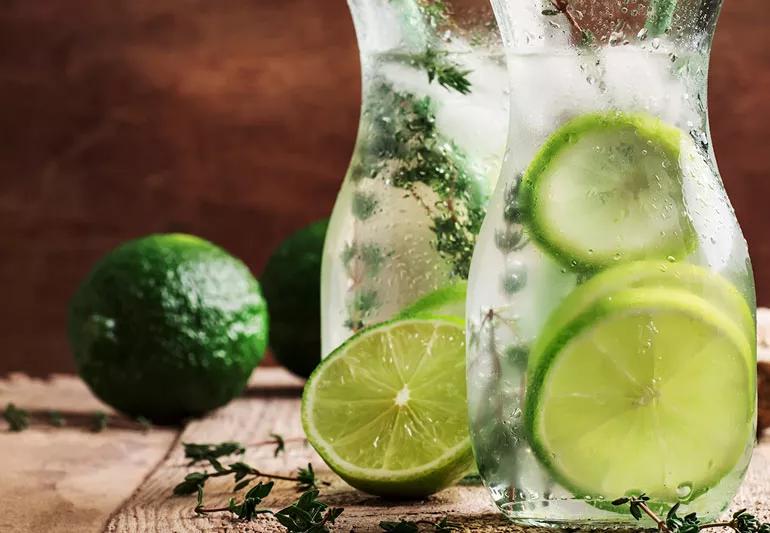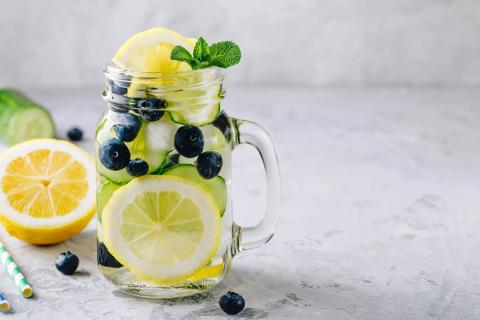Hydrate in style with this healthy twist on H2O

You’ve no doubt heard that it’s important to drink at least eight glasses (64 ounces) of water every day. Some people actually need to be drinking even more than that, according to the National Academies of Science, Engineering and Medicine.
Advertisement
Cleveland Clinic is a non-profit academic medical center. Advertising on our site helps support our mission. We do not endorse non-Cleveland Clinic products or services. Policy
But knowing it and doing it are two different things.
According to a study conducted by the U.S. Centers for Disease Control and Prevention (CDC), the average adult only drinks 44 ounces of water a day. The findings were even worse for children and teenagers: They only average 23 ounces a day.
One of the CDC’s recommendations to improve water-drinking behavior is adding lemon or lime juice. It’s an acquired taste, but for those who enjoy that extra splash of flavor, it may be all the incentive they need to get to — and maybe even beyond — eight glasses a day.
The health benefits that come with staying hydrated are reason enough to make the switch, but the humble lime also packs quite a nutritional punch. As is true of any dynamic duo, the value of lime water may be even greater than the sum of its parts.
We talked to registered dietitian and nutritionist Carly Sedlacek, RDN, LD, to find out why this small tweak to your daily hydration habits might be worth making.
Lime water is exactly what it sounds like: water flavored with juice from a fresh-squeezed lime.
The ratio of lime juice to water doesn’t have to be exact — you can use as much or as little of the fruit as your taste buds dictate. If you’re not sure how much lime flavor you’d like, start by cutting the (thoroughly washed) fruit into quarters and squeezing a single wedge into your cup.
Advertisement
If you want to infuse still more citrus-y goodness into your water, drop the wedge into the water after you’ve squeezed it.
For an even deeper flavor, keep your lime water in the fridge overnight.
Both lemons and limes fall into the category of citrus fruits. Citrus fruits originate from the Rutaceae family.
And both lemons and limes contain a soluble fiber called pectin, which can be beneficial to heart health. They also have similar nutritional profiles, containing calcium, magnesium, potassium and vitamins A, B, C and D.
Although limes and lemons aren’t nutritionally different, limes — as part of the citrus family — can have health benefits such as boosting your immune system and helping with micronutrient absorption.
Like lemon water, lime water has a lot of health benefits. That’s because, according to Sedlacek, “Limes are packed with antioxidants and phytonutrients.” Here, we’ve compiled a list of the common health benefits associated with lime water.
Our bodies are mostly water. It figures, then, that dehydration impacts all of our bodily functions. From digesting food to circulating oxygen throughout our bodies, we do everything a little better when we’re drinking enough water.
Adding lime to your water can encourage you to up your H2O consumption. It’s also healthier than most of the other ways (like artificial sweeteners) that we make our water more exciting.
Skin loves moisture, so drinking water is always a good idea. Fortifying that water with a fruit that’s high in vitamin C is an even better one.
Why? Because vitamin C — in addition to brightening your complexion — stimulates collagen production. Collagen naturally firms and tightens your skin.
You probably already know that the acid in your stomach helps you break down the foods you eat. But did you know that acid levels tend to decline as we age? Limes can supplement that stomach acid.
It’s also worth noting that drinking water helps relieve constipation.
Have you been getting sick a lot recently? Your diet may be compromising your immune function.
Increasing your vitamin C levels (within reason — too much can cause stomach problems) can help you turn things around. Vitamin C can increase the number and quality of your white blood cells. Staying hydrated helps your body produce lymph, which, Sedlacek explains, carries those white blood cells throughout your body.
In addition, the antioxidants found in limes fight inflammation, which strengthens your immune response.
Advertisement
The result: shorter and more infrequent bouts of sickness.
Lime water could be especially useful to folks who are watching their blood sugar. Limes have a low glycemic index, which helps prevent wild sugar swings throughout the day.
We all know that healthy weight loss strategies require you to eat your fruits and veggies and drink plenty of water. But did you know that a study conducted over 24 years found a correlation between increased consumption of citrus and weight loss? We can’t assume that increased consumption of citrus juice is similarly correlated with weight loss, but it’s certainly a good sign.
“Limes are low in calories, high in micronutrients and punch above their weight with regard to both water and fiber content,” Sedlacek says. “They’re really good for us, but most of us aren’t going to make a snack of them. The juice — without added sugar — is the best we can do.”
If you struggle to get enough iron in your diet, or have an iron-deficiency anemia diagnosis, it’s important to get plenty of vitamin C.
When consumed alongside your iron-rich food of choice, the vitamin C in lime water helps your body better absorb those minerals. That’s great news because insufficient stores of iron can lead to hair loss, restless leg syndrome, fatigue and a host of other unpleasant symptoms.
Advertisement
If you have a tendency toward kidney stones, you’d benefit from drinking lime water every day. Citrate — which is found in lime juice — has been shown to dissolve kidney stones and prevent them from forming.
The vitamin C and antioxidants found in limes are also known to reduce stress on the heart.
While certainly less definitive than some of the other preventive properties of lime, a 2021 study found that the more citrus you consume, the less likely you are to develop lung cancer. Further studies are needed to know if those findings are generalizable to citrus juice.
“Limes aren’t a cure-all by any stretch of the imagination, but they are a welcome addition to a healthy diet,” Sedlacek notes.
You don’t need to restrict the amount of lime water you drink in a day any more than you do regular water. While hyponatremia is uncommon, it can happen, so make sure you monitor your water intake, regardless of flavoring.
In fact, you’re more likely to experience the health benefits if you’re drinking it every day. Your best bet is drinking lime water first thing in the morning, in lieu of fruit juice or a sugary coffee drink.
Sedlacek adds, “Starting your day with a sugary drink will make it harder to stay on track throughout the day. A glass of lime water will deliver on flavor without kicking off a craving.”
Advertisement
Adding a spritz of lime juice to your water doesn’t just make it tastier — it adds to the already significant health benefits we enjoy when we’re properly hydrated. Squeezing this new habit into your daily routine is a quick, affordable and easy way to improve your nutrition.
Learn more about our editorial process.
Advertisement

Consumption needs vary based on activity, weather, metabolism and other factors

A glass of lemon water in the morning can help with digestion and boost vitamin C levels, and may even help get you into a better routine

Mold and bacteria in your reusable water bottle can cause health issues like infections, respiratory issues and allergic reactions

Sitting in the dry heat may help reduce stress, improve heart health and relieve pain

Adding salt to your water isn’t going to have measurable benefits — but there may be plenty of downsides

Drinking untreated water can have dangerous consequences, like bacterial infections

Although it adds to your hydration, this water may be pushing you over the limit of the daily recommended dosage of caffeine

If you’re trying to drink less soda or fewer sugary drinks, flavored water can be a delicious and healthy alternative

Wearing a scarf, adjusting your outdoor activities and following your asthma treatment plan can help limit breathing problems

Your diet in the weeks, days and hours ahead of your race can power you to the finish line

When someone guilt trips you, they’re using emotionally manipulative behavior to try to get you to act a certain way